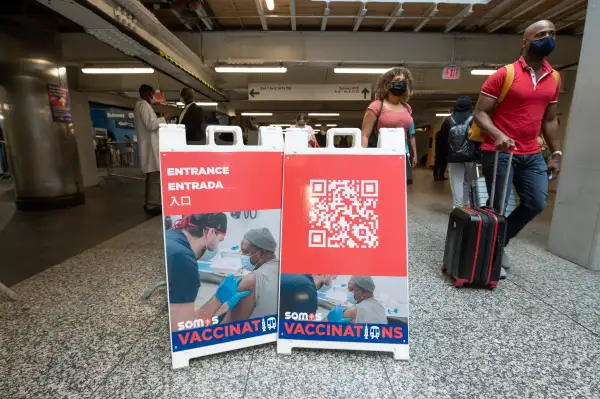Charging Unvaccinated Workers Extra for Insurance Would Motivate Many to Get COVID-19 Shots

Unvaccinated employees are a lot more likely to get COVID-19 shots when faced with the prospect of paying extra for their company health insurance.
In a new survey, 43% of unvaccinated workers said they'd "definitely" get the shot if the alternative was paying a surcharge on health insurance, and another 25% said it might motivate them to receive the vaccine.
Commissioned by Affordable Health Insurance, an exchange, and carried out by Pollfish, the online survey of of 1,000 unvaccinated Americans with company health insurance found that most respondents would likely roll up a sleeve for a surcharge of less than the $200 Delta Airlines soon plans to charge unvaccinated employees. More than six in ten respondents said a financial hit of $100 a month or less would prompt them to get their shots — and more than a third said a surcharge of no more than $50 would do the trick.
Is it actually legal to charge unvaccinated workers extra for health insurance? As we previously discussed, that's not entirely clear. But Delta has seen an uptick in its vaccination rate since the airline threatened to add a $200 monthly surcharge to worker health insurance bills.
Income and the impact of COVID-19 surcharges
Perhaps surprisingly, respondents with higher incomes were more motivated by higher healthcare costs to get their shots than those who made less. Indeed, the more respondents made, the greater the chance of a surcharge for being unvaccinated would make them change their status.
A full two-thirds of those making over $125,000 annually said surcharges would definitely make them get their shots, compared with less than half (45%) of those making between $75,000 and $125,000 and barely a third (32%) of those who made $75,000 or less a year.
Why might the less well-off be less motivated by a financial penalty? Educational status might be a factor. The survey did not ask respondents about their level of education, but educational attainment tends to rise with income, according to the federal Bureau of Labor Standards. And more educated Americans are significantly more likely to be vaccinated than those with lower levels of education.
Echoing other data on the virus and vaccines, the openness of respondents to changing their minds on COVID-19 vaccination varied sharply by political affiliation. More than half of Democrats (58%) would definitely get vaccinated if their health insurance were to cost more, whereas only a little over a third of Republicans (35%) would be so motivated.
Other workplace penalties motivate vaccinations
The survey found that other potential workplace consequences of remaining unvaccinated were less motivating than financial penalties, but would still have some effect. A little more than half said a mask mandate for unvaccinated employees (53%) or losing paid time off after a positive test result (56%) would maybe or definitely prompt them to get their shots.
The survey also asked respondents about any other workplace consequences of remaining unvaccinated. Slight majorities of respondents said they had felt pressure from their employer (55%) to get shots or judgment from fellow employees (54%) for not doing so.
More from Money:
Your Vaccination Status Won't Affect What You Pay for Life Insurance — for Now
Is Delta's Plan to Charge Unvaccinated Employees Extra for Health Insurance Even Legal?
